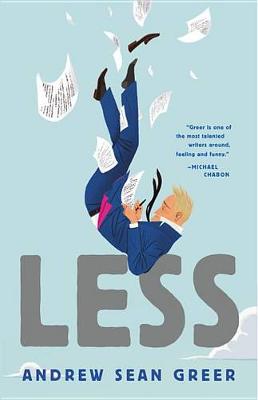Reviewed by gmcgregor on
Less begins by leaving San Francisco for New York, where his new novel is gently declined by his publisher. And then it's off to Mexico, then France, then Italy for a prize ceremony for a translation of his book, then Germany to teach a summer course, then a trip to Morocco with friends, then a retreat in India to work on his book, then Japan to write an article about food for a travel magazine, and finally back, having neatly avoided both his birthday and the wedding. Along the way he runs into an ex he doesn't recognize, has a fling with academic, gets a custom-made suit, steps on a needle, and has to destroy his way out of a room. We get perspective on the life he's led through both his own reminisces and the voice of a narrator, whose identity is finally revealed to us as Arthur Less gets home.
I'll admit I was a little skeptical when this was chosen as a selection for my book club. "Funny" books can land wildly differently depending on the reader, and "prize-winning funny" does not tend to be a type of humor I find especially enjoyable. But what a delight this book was! I've talked before about how much my experience of a book can be impacted by what else I've read in the same time frame, and after the self-serious, sometimes ponderous Shantaram, the breezy lightness of Less just hit the spot. But it's not just a fluffy book at all. It's filled with sharp observations and resonant character notes, and the propulsive forward motion of the journey keeps the plot moving at a nice clip. It never gets bogged down anywhere. And while managing all that, it also excels at blending the moments of humor with sweetly poignant emotional work.
Writing a funny-yet-grounded book is hard, y'all. So many things to be balanced, and the Pulitzer has to be at least in part a recognition of how very well Greer crafted his work. Why, after all this gushing, is this not an even-more-highly-rated book for me? Two things: it didn't linger in my mind (books that I rate 9 or 10 stars stick with me long after reading), and the narrator reveal. While I thought it was an emotionally satisfying way to end the book, it didn't make logical sense, which spoiled it ever so slightly. That being said, it's a wonderful book that I heartily enjoyed, with meditations on aging, love, dignity, and identity that run beneath the parts that make you laugh to make you think. I'd recommend it to everyone!
Reading updates
- Started reading
- 9 August, 2018: Finished reading
- 9 August, 2018: Reviewed
